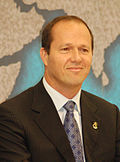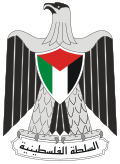| Mayor of the City of Jerusalem | |
|---|---|
 | |
| Residence | 1 Safra Square, Jerusalem |
| Term length | 5 years |
| Formation | 1867 |
| Website | Office of the Mayor |
| Part of a series on |
| Jerusalem |
|---|
 |
The mayor of the City of Jerusalem is head of the executive branch of the political system in Jerusalem. The mayor's office administers all city services, public property, most public agencies, and enforces all city and state laws within Jerusalem. The term of office is five years.
Contents
- History
- List of mayors (1845–present)
- Ottoman Empire (1845–1920)
- Mandatory Palestine (1920–1948)
- Divided Jerusalem (1948–1967)
- Reunited Jerusalem (1967–present)
- Titular Mayors of East Jerusalem (1967–present)
- See also
- Notes
- References
- External links
The mayor's office is located in Safra Square; it has jurisdiction over all the city's neighborhoods. The mayor appoints many officials, including deputy mayors and city departments directors.




















